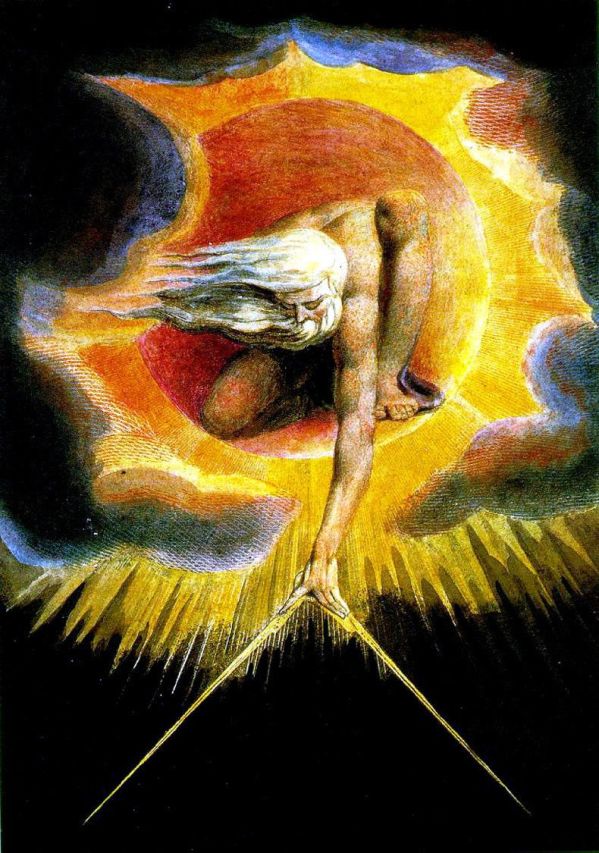 The first verse of the Bible tells us what it’s all about. God is the subject and He is the one doing all the actions that are about to follow. The Bible is a story about God and His dealings with His creation. Now when exactly was this beginning? That is something that the Bible does not answer. It is impossible for us to know. What we do know is what the Scriptures explicitly tell us. They tell us that God created the heavens and the earth in the beginning. There must have been a time before the beginning when there was nothing. We know that God has always existed. All matter has come into existence. Matter has not existed eternally. This is something that we must reject outright. Though the origin of matter (the heavens and the earth) seems somewhat nebulous as far as putting it on a timeline is concerned, we can know that there was a time when matter was not, and that there has never been a time that God was not.
The first verse of the Bible tells us what it’s all about. God is the subject and He is the one doing all the actions that are about to follow. The Bible is a story about God and His dealings with His creation. Now when exactly was this beginning? That is something that the Bible does not answer. It is impossible for us to know. What we do know is what the Scriptures explicitly tell us. They tell us that God created the heavens and the earth in the beginning. There must have been a time before the beginning when there was nothing. We know that God has always existed. All matter has come into existence. Matter has not existed eternally. This is something that we must reject outright. Though the origin of matter (the heavens and the earth) seems somewhat nebulous as far as putting it on a timeline is concerned, we can know that there was a time when matter was not, and that there has never been a time that God was not.
Verse 2 tells us that the earth was formless and void. What could that mean? Several questions arise at this point. How long was the earth formless and void? Did God create the heavens and the earth and immediately say, “Let there be light,” or was there a period of countless years in which there was just a chaotic universe with formless matter floating around in a completely dark abyss? Something we should try to do is only attempt to answer questions definitively that are given explicit answers. This question about the length of the formless and void earth is not one of those questions. Speculation about this period is fine, but those who claim either way are not warranted by Scripture to do so. The verse also mentions that darkness was over the deep. It is worth noting here that it seems the earth is actually covered in water at this point, with no visible land. God will create land on day three, but whether that land is already there and He just makes it surface or if the earth is just completely made of water at this point is unclear to me. The end of verse two gets quite interesting as a new person shows up, namely, the Holy Spirit, who is hovering over the face of the waters. What intrigues me about this passage is that all three persons are involved in the act of creation. We learn in the New Testament that the Son is quite active in creation as well. What seems less obvious, to me at least, is what each person of the Trinity is doing in creation. The Father seems to be the one speaking. The Son seems to be the Father’s agent in creation (John 1:1-3, Colossians 1:15-17). Things get fuzzy for me when I reach the Holy Spirit. He is clearly present and active, but hovering over the waters does not tell me much about His actual role in creation. I would guess that He is in some way blessing creation, already interceding for all of creation.
Day 1 – Then (after an unknown amount of time) God (still the subject) said… I want to stop at the verb because this is actually quite important. The role of speech cannot be overstated. The writer, who I think it is safe to assume is Moses, is trying to make a point that God speaks. Moses heard God speak to Him directly (burning bush), but this is actually one of the defining qualities of our God. He speaks and intends to be understood! Let’s move on. “Let there be…” We’re stopping here again because I think this should be quite surprising for the reader. Interestingly, God is not commanding. It’s almost as if He is removing a barrier to the outpouring of light. The dam is removed and light comes flooding onto the scene. His creative power here seems astonishing. And there was light. Simple. That’s all it takes for God. He then sees that it is good. By good, I think it means that it serves the function for which God created it. God, who is perfect, cannot create a bad thing. What He can do is create things that can choose not to do that which they were created to do. This is not to reveal the limits of His power, but rather the generosity He bestowed on creation to make choices. Jesus rebukes a fig tree because it did not produce the fruit it was meant to produce (Mark 11:12-14 and 11:20-25, and Matthew 21:18-22). It was no longer good because it was no longer serving the function for which it was created. Next, God divided the light from the darkness. This division is actually quite important. Darkness and light serve different functions. They each have roles to play. Another important thing God does here is name the darkness Night and the light Day. Naming things seems to be quite important in Genesis. Names have some special significance apart from just merely differentiating between two things. Naming seems to establish some sort of power or governance. There is order in creation. Not just bringing order to chaotic matter, but also hierarchy. This will be shown more clearly later. Thus after evening and morning passed the first day.
Day 2 – To be quite honest, the second day of creation is probably the most confusing for me. It’s difficult for me to understand exactly what is going on here. Hopefully, after I share my thoughts, someone can help to correct my erroneous ways and bring me some clarity on the issue. This is the day that God creates the firmament. This firmament is in the midst of the waters and divides the waters from the waters. (What?) I’ve read multiple commentaries and could share many views on what this means, but I’m honestly perplexed as to where I stand on what is going on here. The next part of the verse is intended to clarify, but still leaves me confused. God is dividing again, this time dividing the waters which are under the firmament from the waters which are over the firmament. And it was so. This next part really confuses me. God then names the firmament Heaven. Does this mean sky? The NIV thinks so. But most of the other translations stick with heaven. I think it’s referring to the atmosphere, but it’s all so confusing for me. Comments? Thanks. I wanted to note that this is the only day that God does not go out of His way to deem good. This does not mean that it is bad, but why would God look back over every day of creation and say it was good, but not day two? I’ve read a lot of other theories attempting to explain, but I think this might be yet another mystery of day two that I will ponder for many years to come. And mercifully, the second day comes to a close.
Day 3 – Then the waters which are under the heavens (sky?) are gathered into one place and land is finally allowed to appear. Again, I’m not sure if the land is surfacing from beneath the deep or if it it just coming into existence here. Once again, creation does what God “allows” (not commands) and then God names the divisions. After naming Earth and Sea, he then judges both to be good. God then creates plant life. The earth bursts forth with grass, herbs, trees, and all sorts of other wonderfully green and leafy things. The phrase “according to its kind” comes up here for the first time. It will most certainly not be the last. What does it mean that each tree yields fruit according to its kind? Obviously, the reproduction of each kind of plant is only meant to produce that same kind of plant. Once again creation is given roles to play, and each member of creation is judged on how well it plays its own part. Some use the phrase as a defense against evolution. While I see the merit of this approach, I do not think it rules out evolution outright. But I think we will see that a strong case begins to be built up (accepting the authority of Scripture) that evolution is probably not the method God used to create man. Once again, God’s spoken word comes to fruition (see what I did there?) and He then deems it to be good. Thus ended the third day.
*———————————————*
I inserted a break here to indicate that something new starts to happen beginning in verse 14. There seems to be a pattern being followed. Let me explain. Each category of creation has already been established. Next, God will create in the subsequent days things to govern each of the previous day’s creations. It is almost as if God has painted the big picture, and now He is going back and refining His work in each of the previous days, expanding each until they are not only good, but eventually, very good. The problem was that the earth was formless and void. In the first 3 days, He has given form, and in the next 3 days, He intends to fill the void.
Day 4 – God now creates lights to divide night and day and to be for signs and seasons, as well as to reckon the passing of time. It is also meant to give light on the earth. God makes two great lights, that is, the sun and the moon, to rule the day and the night, respectively. While there was light before, now there is something which is ruling over the light, marking the passage of time. There is a structure, a hierarchy. Then, as almost an afterthought, it says that God also made the stars. Those tiny pinpricks of light that fill the sky are among the most beautiful and captivating of all of God’s works (to me at least). The sheer volume of stars and their variety in size, color, and brightness (not to mention distance) absolutely intrigue me. They are like silent ambassadors of light scattered all across the universe, pushing back the darkness. With the most powerful telescopes, it seems we cannot zoom in on a part of space that is not absolutely full of them. If I had to pick a favorite day of creation, I dare say that this would have to be it (although I’m really quite thankful for all of them, especially day 6). I’d also like to note that though the Copernican revolution has occurred, I’m not sure that it has been for the best. I do not even begin to deny the veracity of the heliocentric model for the universe, but I would like to point out that the sentiment of Earth being at the center, as it was in the geocentric model, seems closer to what God intended for us to view ourselves in relation to the rest of the cosmos. The sun, moon, and the stars were created to give light on the earth. Because of modern day astronomy as well as a vast rejection of God through the rise of atheism, many young people today feel quite insignificant. They feel trapped on an insignificant rock in a thin layer of atmosphere circling an average star (one of countless trillions) in an average galaxy (one of billions), in the vacuum of space. This is not the image God wanted to convey. Rather, we are quite special. I do not want to say outright that there is no life anywhere else in the universe, but Scripture seems to indicate that Earth is (and by extension, we are) extremely significant. Though not the geographic center, we are certainly quite central in terms of the focus of God’s creation. Moving on, God saw that it was good and yet another day passed.
Day 5 – Now the waters and the sky are to be filled with life. This is not the first life, but these are the first animals. He tells the waters to teem with life. The whole purpose behind creation seems to be coming into focus here. God seeks to have a planet with an abundance of life that thrives. So the creatures of the sea and the birds of the air are created, again according to their kind. God then sees that it is good. Then God does something that He had not done before in the previous days of creation; He blesses them. He also gives His first command, “Be fruitful and multiply, and fill…” Again, it seems quite important to God that there be an abundance of life on the earth. There is also something special enough about life that it deserves a blessing. Then another day passes.
Day 6 – Finally, the meat and the potatoes. God now creates life on the land, bringing forth living creatures according to their kind. God sees that the life he created was good. But next God created man. He says, “Let Us make man in Our image, according to Our likeness…” This new creation is obviously quite different from the rest. First, God is referring to Himself as Us. An obvious nod at the Trinity. However, I’ve not yet taken Hebrew and would be quite interested to know exactly how this verse reads in the original language. Any Hebrew scholars out there care to share? Secondly, all previous reproductive life that God has made (plants and animals) have been make according to their kind. However, man is made in the likeness of God (imago Dei). This is quite significant, though scholars still disagree as to exactly what that means. What we can say is that God has placed an extremely high value on man, and we are made to be like Him. He also gives man dominion over all the other animals. Verse 27 says, “So God created man in His own image; in the image of God He created them; male and female He created them.” Repetition almost always denotes significance, therefore, this verse indicates that being created in the image of God is of absolute importance. It seems man was the main reason for all the previous days of creation. Everything has been leading up to this moment. Man is the pinnacle of God’s creation. God then proceeds to bless man in a similar way that He blessed the creatures in day 5, but with one important difference. God tells man to multiply, as he did the birds and the sea creatures, but He then re-emphasizes His desire that we subdue the earth. Finally, God shows us that He has provided everything that we need. Our food was originally meant to come only from the plants (created in day 3). In fact, not just man, but all animals seem to have been vegetarians prior to the fall. God then observes everything He had made, and saw that it was very good. All that God had made seems to be in perfect harmony, especially with man on the scene to fulfill his duty as ruler over the earth. Finally, the sixth and final day comes to a close.
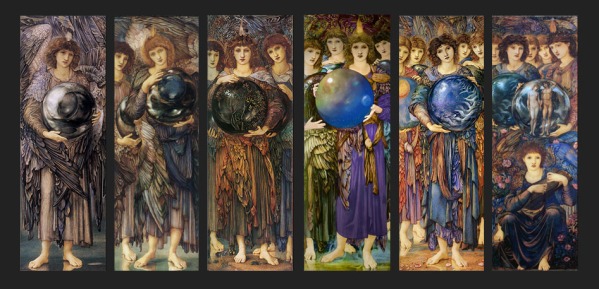 *I do not anticipate future posts to be nearly this long. Thanks for sticking with it and reading the whole thing. I appreciate any comments or questions. Future updates should be much shorter summaries along with a few highlights of things I found significant.
*I do not anticipate future posts to be nearly this long. Thanks for sticking with it and reading the whole thing. I appreciate any comments or questions. Future updates should be much shorter summaries along with a few highlights of things I found significant.
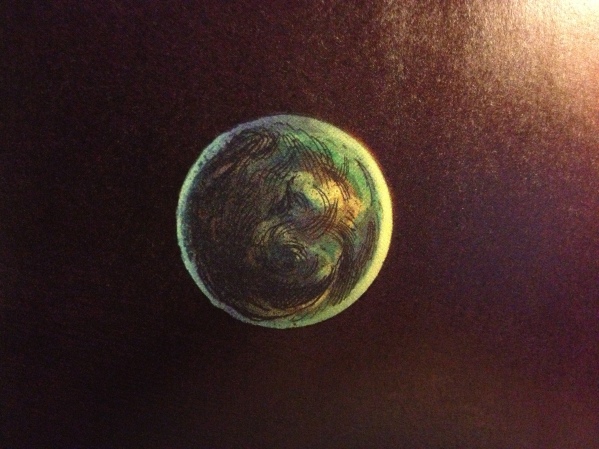
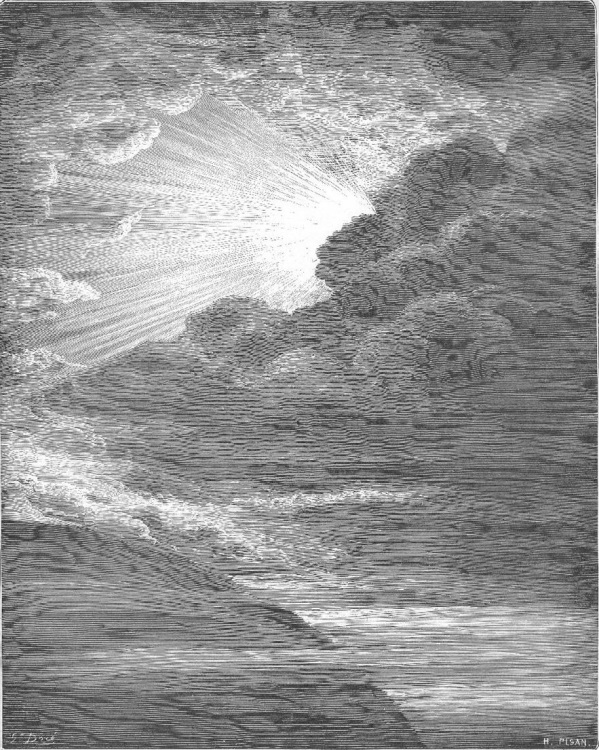
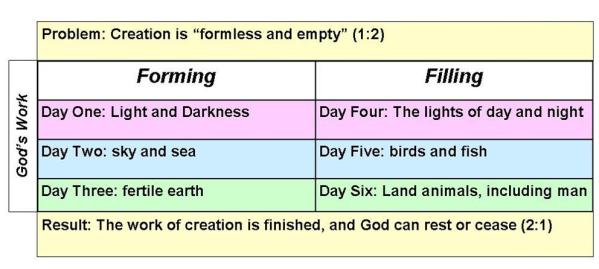
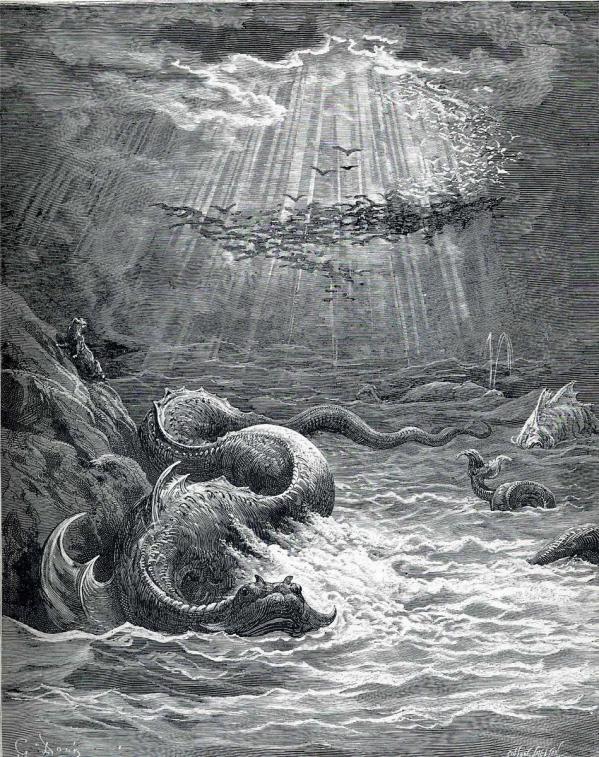
Very interesting analysis. One note of correction: You mentioned the “heliocentric model for the universe” The heliocentric model applies to the planets of the solar system revolving around the sun and is not extended to the universe.
One of the most fascinating things about creation to me is that God made us in his image. God is the master creator and he endowed us with the ability to create, albeit on a much smaller scale! Mankind has a natural ability to create. The ever expanding complexity of our ability to create is unique among living things. To me, it’s like a genetic inheritance from God.
Another fascinating point to consider about creation is that God established laws that govern the universe. We have discovered some of these laws and many are beyond our grasp. The atheist defeats himself by claiming the mantle of science over faith when he so often points to randomness and chaos leading over long periods of time to some outcome (ie life was the result of random collisions of molecules over the course of billions of years….). Seems the atheist is content to sit in front of a pile of iron ore and wait a billion years or so to watch that pile of iron ore randomly reform itself into a Model T Ford. Did the atheist forget that everything in the universe is subject to laws that even he has to acknowledge exist, as science confirms.
As a software engineer, I use programming languages to specify precise functionality and actions in hardware like computers and electronic equipment. When I compare my field to the field of genetics, it is striking just how similar these fields are. Genetics show us that there are precise sequences of genetic markers that specify all the functions that make up life (ie hair color, skin color, human, fish, dog, etc). As an engineer, I immediately see the handiwork of another engineer; a master engineer, God. The genes that make up life work very much like a programming language. This screams to me that we were designed! Atheists have a very hard time countering this.
Many people see science as a weapon that can be used to disprove God. On the contrary, I see science as a big time validation of God. I think when one ponders whether the earth is 10,000 yrs old or billions of yrs misses the whole point. The point is that Genesis introduces us to God, who created the universe. God is not subject to time. It’s even written that “a day to the Lord is like a 1000 years”. In my opinion, I believe Creation story was written the way it was in order for people who had no understanding of such complex actions to grasp creation in a way that was understood in an allegorical style.
Keep it coming Nick!
Obviously, the sun is not the center of the universe. Universe here refers to our section of the cosmos. In the geocentric understanding of the universe, the earth really was at the center of the universe. Referring to the heliocentric model of the universe does not mean that the Sun is at the center of the universe as a whole, but that our concept of centrality shifted from Earth to the Sun. Our understanding of the universe in reference to ourselves became heliocentric, if you will.
Nick, I’m actually glad that you didn’t cut this section just to make it concise. To me, the entire creation is a beautiful picture of God’s love for us. Even before creating us, His children, He made sure we had everything we needed. As you so eloquently wrote, the trinity was already in existence. God already knew prior to our creation that the only thing we would still need would be a Savior. Even this, He had already provided for, even though the time was not yet perfect for Him to send Jesus into the world. What a great God we have!
I just heard that the ancient Hebrews conceived of heaven as being in three layers, and that the first layer was the atmosphere. So it would seem logical that in Genesis 1 He meant the waters above the atmosphere – which come in clouds and rain – and the waters below the atmosphere in rivers, oceans. It doesn’t matter if heaven really comes in three layers or not, I think, because God speaks to us in human language, in our own ideas. If He tried to correct every mistake in our understanding, He would have never had time to get to Genesis. Anyway, I think it makes sense to take the firmament as sky.
This chapter is so fundamental and contains the beginnings of so many threads that are pursued in the rest of the Bible that you did a brilliant job holding your thoughts into this compact a space. I am glad you didn’t shorten it any more. I am a teacher by trade (math) so I tend to never stop talking. It is a professional hazard I guess. I hope to gradually catch up with where you are now.
Thanks for your analysis. I think writing this blog has helped me understand how difficult interpretation of the Bible can be. But it has also helped me learn that I don’t need to understand every detail to learn more about God. He’s communicated with us and desires to be understood. It’s our job to make sure we don’t get caught up on the particulars and miss out on the blessings He has for us. The grand narrative of Scripture tells me all I need to know: God loves me and desires to restore His relationship with me, and then use me to help restore others as well.
Anyways, glad to know you’ll be along for the ride. I love your site. I can see you are much further along in your blog, but I’m excited to keep moving and try to finish Genesis. I’ll have a much better perspective of the size of this project once that’s done (1/66!).
That is so important, that we don’t have to understand every detail. Even in a human subject like geology or Victorian literature, who can understand every detail. It is more so with God. And interpretation is really really hard. But He helps.
Thank you for following my blog. One thing about Genesis and evolution: plants were created before the creation of the Sun. If the “days” are geologic ages, then how did they survive? I don’t think the earth is only 6000 years old, but neither do I think it’s the billions of years old required by materialistic science. Also, I think the “1000 years is as one day” to God shows us that we don’t really have a concept of “duration” as far as God is concerned. Finally, it seems to me that Genesis tells us that creation was finished when God called it into existence, not that it was just begun, and left to evolve into something beside what God originally made it. God’s blessing on your studies.
The period between verse 1 and 2 can be millions or billions of years. When God created the heavens amd the earth, the angels sang, so I don’t think so that God created a dark earth. The beautifully created earth become dark when Satan was thrown out of heaven and confined to earth. Ya, Satan hit the ground pretty hard.
Btw, verse 2 says the earth “was” without form, etc., which is a bad translation. The better translation for this Hebrew word is “became”. The earth “became” formless… Because Satan was casted down to earth and he became the opposite of who he was, he became dark, so goes the earth. And then God brought back the light, not created the light. God already created the light from the beginning, He was just clearing out the clouds from the ice age so that the sun can reach earth for the first time in millions or billions of years.
What I’m trying to say here is that God doesn’t create land on Day 3 like you wrote. He already created land from the beginning, at verse 1. God did not create a dark earth without land, which you are implying. Come’on… The Bible, the real Bible, not the translations, requires common sense to understand, not just knowledge with explicit answers, you have to search the Word.